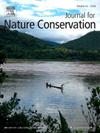探索利益相关者参与湿地管理和保护的意愿:伊朗西部Zeribar城郊湿地的条件评估研究
IF 2.5
3区 环境科学与生态学
Q2 BIODIVERSITY CONSERVATION
引用次数: 0
摘要
湿地保护工作在很大程度上依赖于利益相关者的积极参与和支持,特别是在湿地位于城市和农村社区附近的情况下。本研究旨在探讨湿地保护中利益相关者参与意愿的动态变化,并以伊朗西部Zeribar近郊湿地为研究对象。随机抽取406人进行面对面问卷调查,回复率为94.1%。绝大多数(80%)受访者认为,Zeribar湿地面临不同的威胁,包括严重的污染。然而,人们对社区参与保护工作持相当大的怀疑态度,只有24%的人同意当地社区积极参与,而62%的人不同意或强烈反对。本研究的一个关键方面涉及条件价值分析,该分析探讨了利益相关者接受湿地保护工作补偿的意愿。结果表明,每年提供264.6 × 106伊朗里亚尔(IRR)的补偿可有效鼓励农户参与湿地管理和保护项目。不同利益相关者群体(包括农村(RC)和城市社区(UC)、政府机构(GA)、私营部门行为体(PA)和非政府组织(ngo))的WTA偏好值差异显著。基于WTA补偿形式分析,UC群体主要倾向于现金支付,占WTA价值的51%,而RC、GA、ngo和PA等群体对湿地在环境保护和增强生态系统服务方面的作用表示赞赏,他们对现金的偏好较低。技术培训尤其受到GA(45%)和PA(28%)群体的青睐,城市社区和非政府组织也表示对这种形式的补偿感兴趣。Tobit回归分析显示,男性和年龄较大的受访者接受薪酬的意愿明显较低,性别(β = - 3.52)和年龄(β = - 2.32)的负系数表明了这一点。相反,教育水平越高(β = +5.32)、家庭收入越高(β = +4.32)、居住时间越长(β = +4.58)和农业用地面积越大(β = +5.87)对WTA产生正向影响,表明它们对保护和管理方案的价值有影响作用。综上所述,本研究为政策制定者和保护从业者提供了有价值的见解,旨在促进Zeribar湿地生态系统以及全国其他城市湿地的可持续保护实践。本文章由计算机程序翻译,如有差异,请以英文原文为准。
Exploring stakeholders’ willingness to engage in wetland management and conservation: A contingent valuation study of the Zeribar peri-urban wetland in western Iran
Wetland conservation efforts rely heavily on stakeholders’ active engagement and support, particularly in cases where wetlands are situated near urban and rural communities. This study aimed to explore the dynamics of stakeholder participation willingness in wetland conservation, focusing on the Zeribar peri-urban wetland in western Iran. A total of 406 individuals were randomly chosen to take part in a face-to-face questionnaire-based survey, achieving a response rate of 94.1 %. A significant majority (80 %) of the respondents believed that the Zeribar wetland faces different threats including severe pollution. However, there is considerable skepticism regarding community involvement in conservation efforts, with only 24 % agreeing that local communities are actively engaged, while 62 % disagreed or strongly disagreed. A key aspect of the study involves the contingent valuation analysis, which explores stakeholders’ willingness to accept (WTA) compensation for wetland conservation efforts. The results showed that offering compensation of about 264.6 × 106 IRR (Iranian rials) per year could effectively encourage households to participate in wetland management and conservation projects. This WTA preference value significantly vary across stakeholder groups, including rural (RC) and urban communities (UC), government agencies (GA), private sector actors (PA), and non-governmental organizations (NGOs). Based on the WTA compensation format analysis, the UC group predominantly preferred cash payments, accounting for 51 % of WTA values, whereas groups such as RC, GA, NGOs, and PA, who appreciated the wetland for its role in environmental protection and enhancement of ecosystem services, showed lower preferences for cash. Technological training was notably favored by GA (45 %) and PA (28 %) groups, with urban communities and NGOs also indicating interest in this form of compensation. Tobit regression analysis showed that males and older respondents were significantly less willing to accept compensation, as indicated by negative coefficients for gender (β = −3.52) and age (β = −2.32). Conversely, each additional educational level (β = +5.32), higher household income (β = +4.32), longer duration of residency (β = +4.58), and larger agricultural land area (β = +5.87) exerted positive influences on WTA, demonstrating their influencing roles in valuing conservation and management programs. In conclusion, this study provides valuable insights for policymakers and conservation practitioners aiming to promote sustainable conservation practices in the Zeribar wetland ecosystem as well as in other urban wetlands across the country.
求助全文
通过发布文献求助,成功后即可免费获取论文全文。
去求助
来源期刊

Journal for Nature Conservation
环境科学-生态学
CiteScore
3.70
自引率
5.00%
发文量
151
审稿时长
7.9 weeks
期刊介绍:
The Journal for Nature Conservation addresses concepts, methods and techniques for nature conservation. This international and interdisciplinary journal encourages collaboration between scientists and practitioners, including the integration of biodiversity issues with social and economic concepts. Therefore, conceptual, technical and methodological papers, as well as reviews, research papers, and short communications are welcomed from a wide range of disciplines, including theoretical ecology, landscape ecology, restoration ecology, ecological modelling, and others, provided that there is a clear connection and immediate relevance to nature conservation.
Manuscripts without any immediate conservation context, such as inventories, distribution modelling, genetic studies, animal behaviour, plant physiology, will not be considered for this journal; though such data may be useful for conservationists and managers in the future, this is outside of the current scope of the journal.
 求助内容:
求助内容: 应助结果提醒方式:
应助结果提醒方式:


